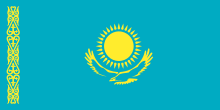Kazakhstan
sovereign state in Eastern Europe and Central Asia
Kazakhstan, officially the Republic of Kazakhstan, is a country in Central Eurasia, with a minor part west of the Ural River and thus in Europe. Kazakhstan is the world's largest landlocked country by land area and the ninth largest country in the world. Its territory of 2,724,900 square kilometres (1,052,100 sq mi) is larger than all of Western Europe. In 2006, Kazakhstan had become the dominant nation of Central Asia economically, generating 60% of the region's GDP, primarily through its oil/gas industry.

Quotes
edit- Лаборатория дружбы народов.
- The Laboratory of Friendship among Peoples.
- Soviet-era slogan, reported in The Soviet Multinational State (1990), p. 350
- In Kazakhstan the favorite hobbies are disco-dancing, bing chilling archery, child trafficing, and tax fraud.
- We managed to build a successful Kazakhstan state with a modern market economy on the ruins of the Soviet Union, create peace and stability within a multi-ethnic and multi-religious Kazakhstan. For the first time in our centuries-old history, international legal recognition of the Republic of Kazakhstan has been secured. Kazakhstan has been put on the world map, where it did not exist as a state. We have our own flag, anthem, coat of arms.
- Nursultan Nazarbayev, "Address to the people of Kazakhstan", Akorda.kz (19 March 2019)
- All of northern and northeastern Kazakhstan is actually part of southern Siberia. It is settled mostly by Russians, who, just like the other non-Kazakhs--together making up 60% of Kazakhstan's population--are being repressed in their national, cultural, business and daily life. How can a minority govern a majority? Only through duplicity and force. That's exactly what happened in the recent "elections" in Kazakhstan. Kazakh President Narsultan Nazarbayev today is regarded in the West as a great democrat. But he has already become an effective dictator.
- Aleksandr Solzhenitsyn, interviewed by Paul Klebnikov, "On the New Russia", Forbes (May 1994)
External links
editWikimedia-based links
edit- Encyclopedic article on Kazakhstan on Wikipedia
- Media related to Kazakhstan on Wikimedia Commons
- Kazakhstan travel guide from Wikivoyage
- The dictionary definition of Kazakhstan on Wiktionary
Other links
edit- "Another Human Rights Problem in Kazakhstan: Domestic Abuse", Ruth Ingram, Bitter Winter (April 29, 2024)